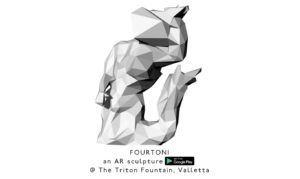The virtual sculpture’s content was driven by research concerning the combination of the cortical homunculus representation of our body in our brain, and eye-tracking results involving free gazing. This aspect of the project was discussed with Prof. Ian Thornton from the Department of Cognitive Sciences.
Want to push a mouse around Valletta? Trigger an artwork with your body? You can head to our capital Valletta on Friday 28 September and join in the fun and empowerment of the science and arts festival: Science in the City 2018 – European Researchers’ Night, between 18:00 and midnight.
At Triton Square, three larger than life interactive installations – Of Mice, Carbon and Tritons – will be displayed to engage with visitors: a giant computer mouse, a virtual sculpture, and an interactive art piece. ‘This specific project is a collaboration between the University of Malta, Valletta 2018 Foundation and University of Applied Arts, Vienna. It embodies the core values of the festival in creating relationships across disciplines, and fusing science with the arts to entertain and educate in a uniquely engaging way,’ said Dr Edward Duca, Manager Science in the City.
‘
Pushing the Mouse‘ by artists Michael Bachhofer and Stefan Resch and researcher Marthese Borg, is a giant computer mouse that visitors can push around the Triton Fountain. Another installation will be a high-tech augmented reality experience called The Fourth Triton designed by Matthew Attard and Matthew Galea in collaboration with University of Malta researchers Dr Vanessa Camilleri (Faculty of ICT) and Professor Ian Thornton. This unique structure can be accessed from your smartphone and visitors can see the virtual artworks brought to life.
Reforming Carbon, an artwork inspired by Malta’s rich heritage will also transform St George’s Square and is triggered by your body, created by Daniela Brill Estrada and Guadalupe Aldrete and researchers Dr Ing. John Betts, Dr Catriona Brogan and Rowan McLaughlin.
The Malta Chamber of Scientists has joined forces with Creativity for Life and the Inspire Foundation in a Creative Communities project to build Ekologija. These three kaleidoscopic installations are the work of Inspire students, who learned about the local flora and fauna from the biologists themselves. Artists Liliana Fleri Soler and Gabriella Agius, and Inspire’s therapists guided the students in sculpting, sticking, moulding and painting, a myriad of organisms. Look out for this installation at the corner of Republic and St John’s Street.
Wiki Loves Monuments, an annual international photographic competition organised by Wikimedia groups and chapters, and Magna Żmien, another Valletta 2018 project, will be held at Spazju Kreattiv. Magna Żmien is aiming to preserve and provide access to local historic content from the past century that has been captured on analogue sound and image equipment by Maltese.
Visitors can explore the different layers of the Mediterranean seabed at Ħoss fl-Ilma, a fusion of geoscience, electro-acoustic music and an interactive art piece on the stairs leading to Hastings.
The National Museum of Archaeology will be opening its doors to a discussion on conservation science through an excellent case study of the Gran Salon project. Sessions will be held on the hour between 19:00 and 22:00.
The Science in the City festival—European Researchers’ Night is funded by the Marie Skłodowska-Curie Actions of the Horizon 2020 Program (H2020, 2014–2020) of the EU. The consortium is led by the University of Malta, Malta Chamber of Scientists and the University’s Research Trust (RIDT), in partnership with Valletta 2018, Parliamentary Secretary for Financial Services, Digital Economy and Innovation, MCAST, Esplora, JUGS Ltd, Studio 7, BPC International, GSD Marketing Ltd, Aquabiotech Ltd, MEUSAC, PBS, Spazju Kreativ, Pjazza Teatru Rjal, Valletta Local Council, Notte Bianca, Melita, More or Less Theatre, Transport Malta and Arts Council Malta.


